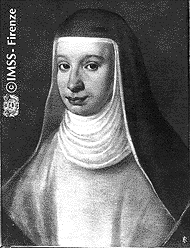Galileo was born in Venice, Italy on February 15, 1564. His father, Vincenzo Galilei, wrote music. Galileo's mother was Giulia degli Ammannati. In 1570 he moved to Florence, Italy.
In 1581, he went to study at the University of Pisa. His father wanted him to study medicine. He began studying the pendulum. According to legend he looked at a church pendulum and he was intrigued by the movement of the pendulum. After he graduated University of Pisa he studied the pendulum for many more years. In 1602, he made is most important discovery about the pendulum. The time it takes the pendulum to swing back and forth does not depend on the arc of the swing. This discovery would lead to the development of his pendulum clock.
Also while at University, he also studied the Ancient Greek, Aristotle. He believed that heaver objects fall faster then lighter ones. Galileo disproved this theory by proving that all objects fall at the same rate in a vacuum. He made a book about his findings called De Motu, which means On Motion.
Galileo was never married, but he had 3 kids with Marina Gamba. He had 2 daughters, Virginia and Livia, and a son named Vincenzio. The daughter were placed in a convent and became nuns, and his son joined him in his studies.
During this time, he was drawn into the study of Dante's Inferno. He wanted to answer this question from the viewpoint of a scientist. He drew a conclusion that the devil is 2,000 arm lenghts longs, the same length of St. Peter's Cone in Rome, Italy. The scientist community was very impressed with this conclusion.
The telescope was Galileo's most famous invention. His first telescope was constructed in 1609 and was designed like telescopes produced in other parts of Europe. They could magnify three times, and Galileo's telescope could magnify up to twenty times. He was able to see almost all parts of space with this telescope. This allowed him to prove that the Earth and other planets revolved around the sun.
Galileo believed in the Copernican System, which says that the Sun is the center of the universe. This belief got him in trouble with the Catholic Church. The Inquisition, the "police" of the Catholic Church. They told him to stop talking about the Copernican system. Later, he published a book about it, and when the Inquisition found out, he was put on trial in 1633. He was sentenced to a life term of house arrest. In 1638, he was allowed to move to Florence to see doctors for his health. In 1642, he died in his home near Florence, Italy.
Sources: Helden, Al Van. "The Galileo Project." rice.edu. 1995. 25. Jan. 2011 <http://galileo.rice.edu/>




